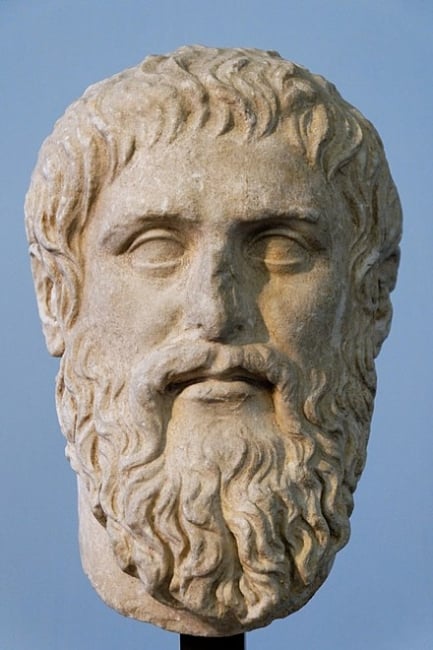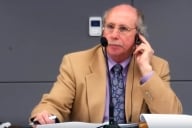You have /5 articles left.
Sign up for a free account or log in.

Plato
Wikipedia
About 20 years ago, while in my 20s and experiencing a bit of an existential crisis, I read Plato’s Apology for the first time. Plato’s portrayal of Socrates spoke to me in a way that possibly no other piece of literature ever had. His sense of wonder, his humility, his search for truth and what it means for a human to live a good life inspired me to raise the bar for my own life and my own pursuit of the true, the good and the beautiful. Plato’s Apology led me to read other great texts; it inspired me to pursue a second degree in philosophy; it led me to question my faith much more critically and eventually go much deeper in my prayer life; it even helped open my mind to the possibility of starting a tech company, which I eventually did. Socrates became one of my heroes.
Over time, as I read more classic texts, the more I realized what a tremendous gap there had been in my own education, from Sugartown Elementary School all the way through Georgetown University.
The classics have helped me grow as a reader and a thinker, they have given me a greater appreciation of the great philosophical and theological questions, they have deepened my understanding of the human condition, they have raised the bar for what I want to accomplish in life, and they have given me a chance to participate in what has become known as the Great Conversation that has spanned the last several thousand years of human history.
I have become convinced that reading the classics should be an integral part of anyone’s education. We should start reading them early, read them repeatedly and never stop. This is why I support inner-city schools and Roman Catholic schools that adopt classical, liberal curriculums. This is why I helped start Cana Academy -- to serve schools that want to read the classics and discuss them in Socratic seminars. And this is why I support the start-up Classic Learning Test as an SAT/ACT alternative.
The CLT places a heavy emphasis on classic texts -- spanning a time period of over 3,000 years, ranging from Homer and Plato in the ancient world to Mark Twain and Harper Lee in the modern world. They include a wide diversity of viewpoints, geographies, historical time periods and ethnicities. They include both men and women. Saint Augustine was from North Africa. Fyodor Dostoevsky and Leo Tolstoy came from Russia. Frederick Douglass and Martin Luther King Jr. were African American. Emily Dickinson was from New England. Flannery O’Connor was from the deep South. Jane Austen and William Shakespeare were English. Aquinas and Dante were Italian. Cervantes was from Spain. Aristotle was from Greece. Adam Smith was a capitalist. Karl Marx was a socialist. Classic texts include the authors of the Bible, none of which were “white.” I could go on. It is a fairly diverse group!
Could it be even more diverse? Undoubtedly! Why isn’t it, then? Like so many things with a long history, it is complicated. Oppression is unquestionably part of the story. So is culture. For example, Socrates was such an extremely unique and influential character that any group that followed in his footsteps or was exposed to him was bound to be at an advantage over other cultures when it came to the field of philosophical inquiry.
Can we just start adding more female authors or more authors from areas of the world that are less represented such as eastern Asia or sub-Saharan Africa?
While it may be a nice gesture, it does not fix the root problem. Including people just because they are from an underrepresented group would be an insult to the literary field and our intellectual pursuit of truth. You don’t pick the best athletes of all time by first trying to be diverse. Or the best sprinters or mathematicians or physicists or entrepreneurs or statesmen or astronauts or painters. You don't pick the best writers that way, either. Instead, when you identify an underrepresented group in any human endeavor, you aim to discover why, address any inequities and strive to improve in the future according to the standards of the field -- excellence in sports, excellence in writing, excellence in any field.
What excellence do we see in classic works of literature? Classics -- both modern and ancient -- articulate great insights into humanity; engage in a dialogue that was largely started by Homer, imaginatively, and Socrates, philosophically; are cited by many other great writers and texts; and have an outsize influence on our modern society, both here in the United States and across the world. We can't go back in time to 300 or 3,000 years ago and insert more women who had the opportunities to write great texts. But we can make sure that we understand and solve the root causes of why women have had fewer opportunities to write great literature so that in future centuries we will eventually have more women. In fact, I think it is clear that the trend has already begun. Just look at the number of women from the last 200 hundred years vs. the prior 2,000 who have authored works that are considered to be classics by many.
We cannot change the past. Instead, we fix the present, so that we have a better, more inclusive future.
Various forms of oppression are a sad part of our human history but they are far from the whole story. Despite our shortcomings, we still have an amazing history of great art, music, science and, yes, both literary and philosophical texts that have guided a rich dialogue that has spanned the ages. We have much to learn from the great minds and writers who have preceded us, regardless of their own flaws and the flaws of the societies from which they emerged. (In fact, we remain flawed.) To ignore the classics in the education of our children would be to doom them to a life of ignorance and lost potential. And it goes without saying that the CLT strives to reach children of all backgrounds -- from public and private schools. Already there are some notable charter schools that see the importance of the classics; I can only hope that some district schools will see the value of classic literature and afford their students a comparable opportunity.
I would invite everyone to follow the lead of one of the greatest American leaders of the 20th century: Martin Luther King Jr. Although King was a Southern Baptist, completely invested in the improvement of the modern world, his "Letter From a Birmingham Jail" cites the principles of two medieval Catholics, Augustine and Aquinas. Even more remarkably, his “I Have a Dream” speech invokes the words of the Declaration of Independence and the Constitution, chiefly written by two slaveholders, Thomas Jefferson and James Madison, respectively. Obviously, he did not invoke them because they were slaveholders; he invoked their principles, because like the natural law principles found in the two medieval writers with whom King was in dialogue, the principles of the founding were true -- and they were desperately needed as standards by which he and the civil rights movement could gauge the state of racial justice in America.
Most men and women have not been saints, yet none of us deserve to be reduced to our worst traits. The greatest minds that our world has ever seen were imperfect. This is merely part of our humanity. Let us adopt a disposition of charity and forgiveness if we want to learn from them and enjoy the fruits of their wisdom despite their shortcomings. And hopefully future generations will offer us a similar courtesy.








